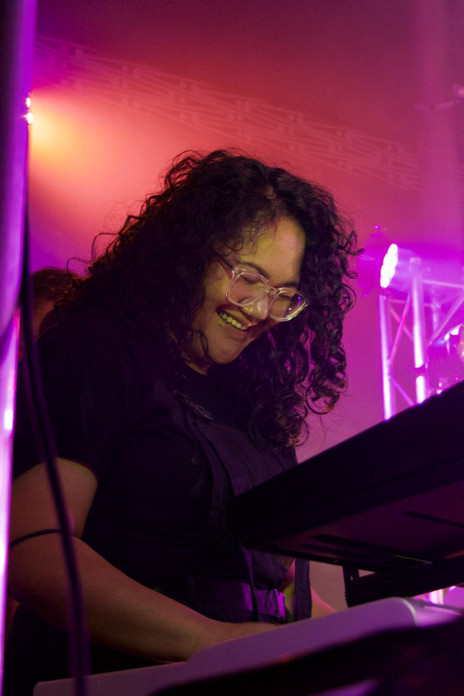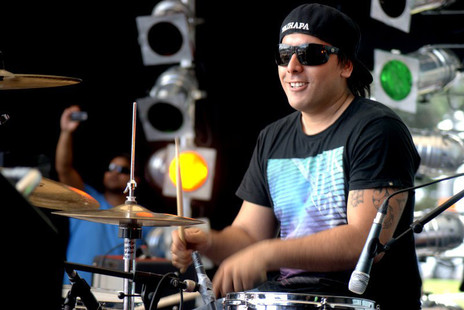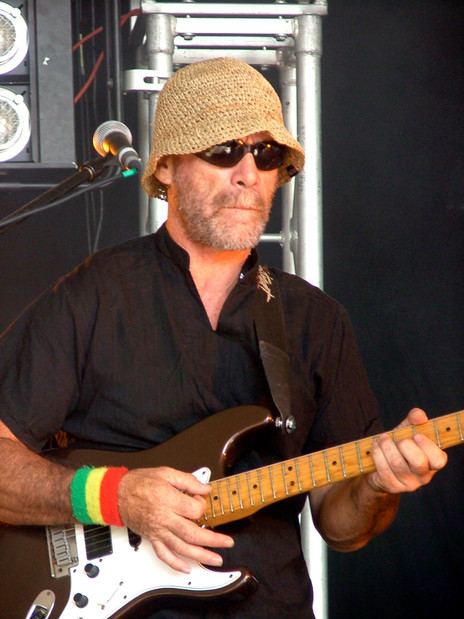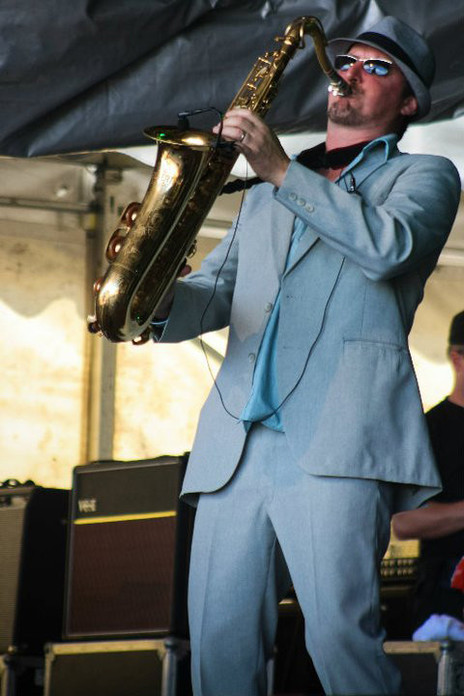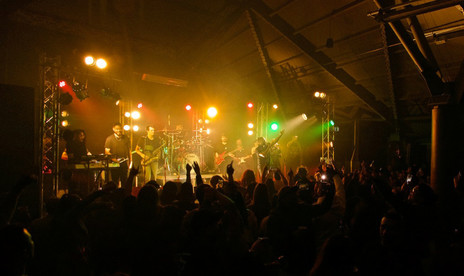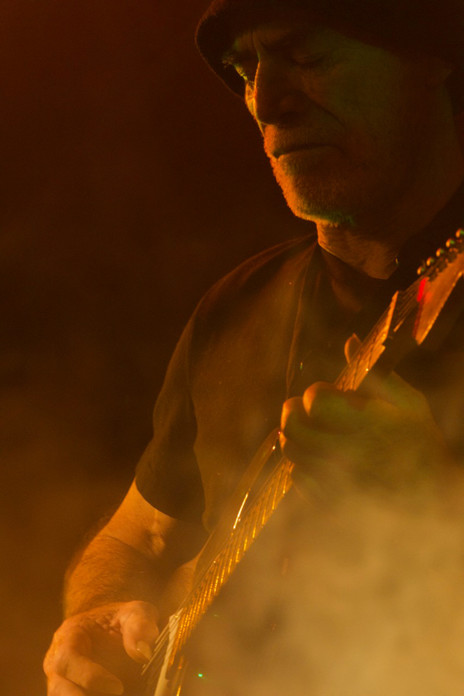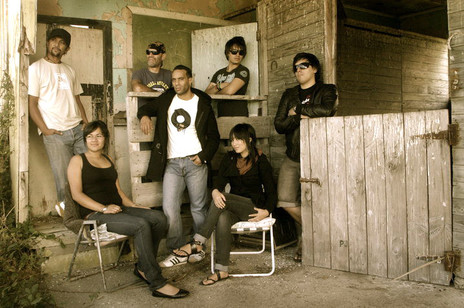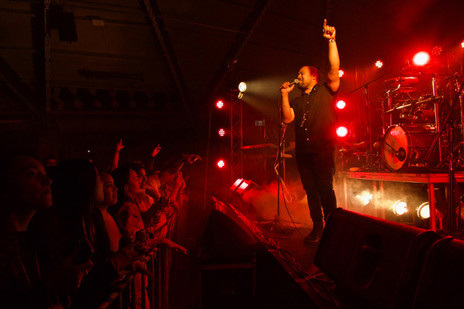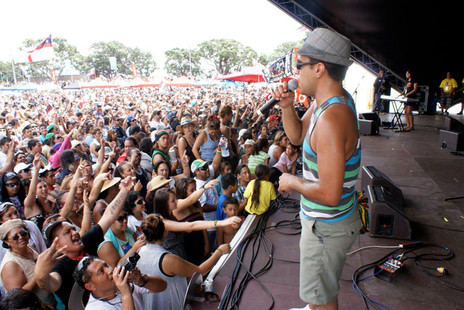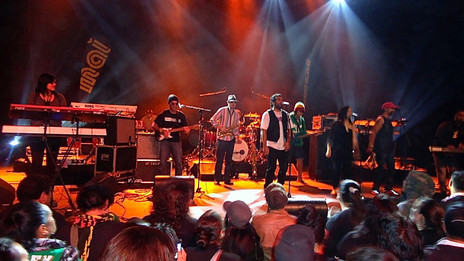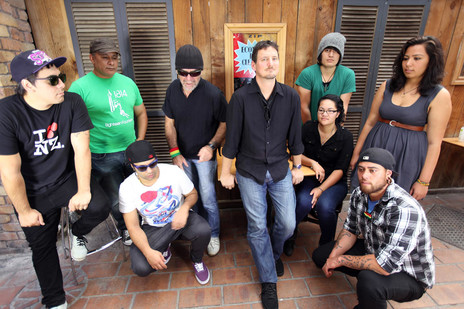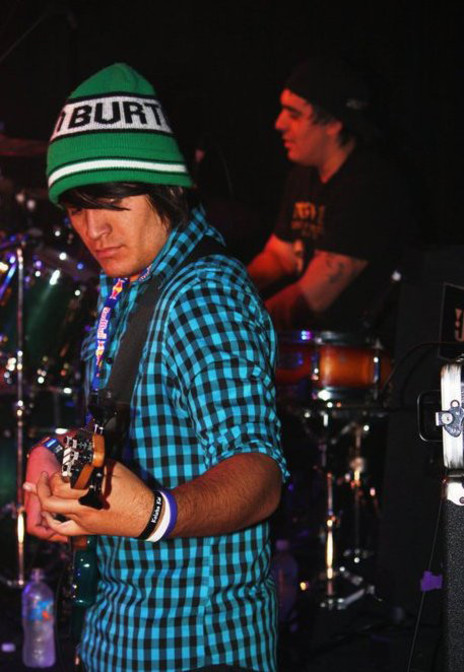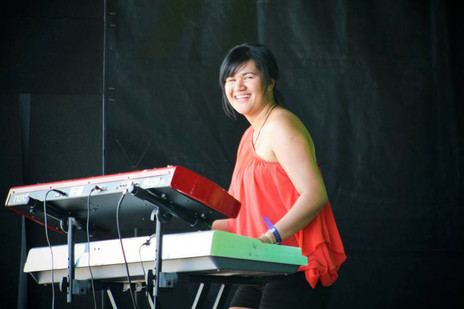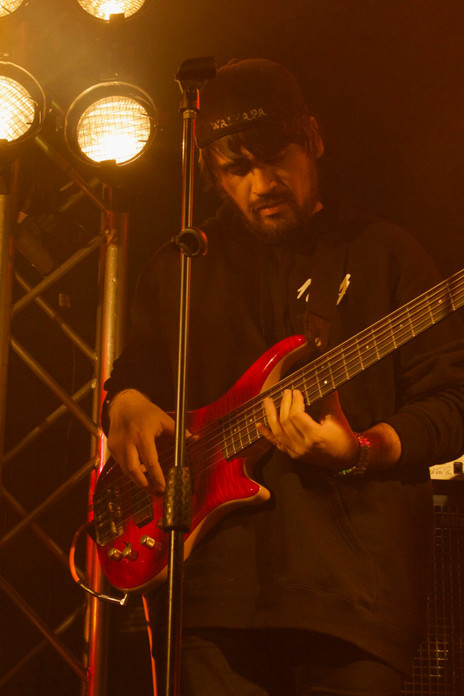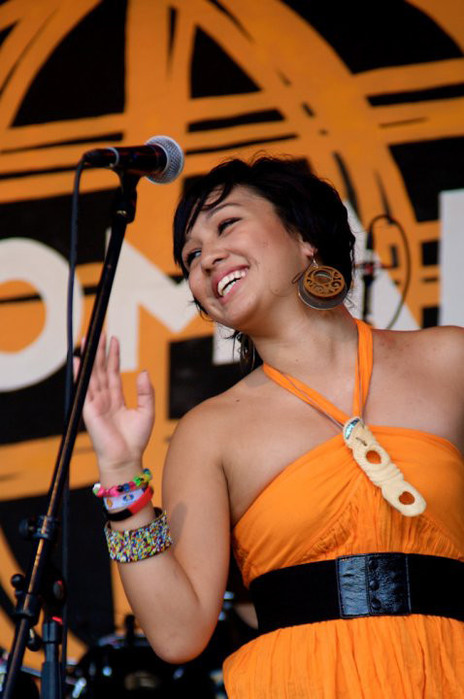A musical family
It all began in 1999, when Patu Colbert started playing music with his sons Jimmy and Shaun Colbert. The family was based in Kaeo, near Kerikeri in Northland. Between 1999-2003, they started playing at church, small community events and writing music at home. People in the community were enjoying the music, so the band grew a little bigger with the addition of backing vocalist Katherine Te Haara-Atama.
In 2004, Patu and the boys decided to record their first album and name the group 1814. They chose the name because it was the first year that missionary Samuel Marsden arrived at Oihi Bay, located in the Bay of Islands. Marsden gave the first known sermon of Christianity in Aotearoa.
“The idea was to bring the word to the people through our music, following our vision, with Christian values,” says Jimmy Colbert. “This is the foundation of 1814.”
Their first attempt at recording was at Muscle Music Studios with Wiremu Karaitiana (Billy Kristian), whose own amazing career involved working with Ray Columbus and The Invaders, Max Merritt and the Meteors, and Headband, before he moved into studio work which included producing two hit albums for Herbs.
For the next few years, 1814 played around Northland as a four-piece. Patu arranged for them to put on their own production for each show, which meant bringing their own PA and other equipment. This meant they could play venues without their own backline and therefore were able to tour more extensively than other bands, which led to them selling out shows in some very out of the way places. It also required hard work, since the band would have to turn up in the afternoon to set up. Patu also suggested that where possible they would play with a black curtain behind them, so that they looked like they were putting on a professional show rather than just tucking themselves in the corner of a bar or hall.
One of the band’s earliest breaks came after they performed on Māori Television with Ardijah. The crew on the show asked them to perform again in future and more gigs came through this connection. Another big moment was having their track ‘Get Up’ appear on the third edition of the influential Conscious Roots series of compilations in 2006. Three Houses Down and House of Shem were also recording their first songs at this time, so it felt like there was a new generation of local reggae acts coming through.
‘Get Up’ was chosen as the first track on the Conscious Roots compilation and this encouraged Patu to expand the band’s line-up, so he worked with Jimmy to create an eight-piece. Their cousin Darren Katene took over lead vocals, Maihi Pinker joined on backing vocals, Korey Atama on guitar, Reuben Heger on saxophone, and Des Brown on keyboards.
They booked one of the country’s top studios, York Street Recording Studios, and again brought in Karaitiana to have a second attempt at making a debut album. Patu and Darren Katene brought lyrical and musical ideas to the practice room where they were moulded into songs through long rehearsal sessions with the band. Jimmy found that Karaitiana leant on him as a fellow bass player, but the result was worth the mahi.
1814’s debut album was produced by Billy Kristian. “We were blessed to work with someone with that history.”
“I’ve been producing a few upcoming acts, so I understand it now. There's a standard that you have when it comes to the bass playing … when you hear a mistake it sticks out more than anything else. Billy was hard on me, but when I look back at it now I realise we were blessed to work with someone with that history. We didn't realise at the time how important he was, but I think that's what he loved about working with us – we just treated him like he was an uncle. In this industry when you climb that ladder, you find yourself with all these so-called friends and a lot of people want something from you. He was just a guy that lived down the road but he respected Dad, and Dad respected him.”
Jah Rydem came out in 2008. Its cover was emblazoned by three half-faces which looked like they’d been carved and then individually coloured, but the images were based on art works that Patu’s daughter Paddi Holmes had created for school, which were then arranged as a trio by Shaun. The band initially released the album themselves but received a boost when it was picked up for distribution by Ode Records in 2010.
The album opened with ‘Morning Star’ which provided a powerful slice of Pacific funk and showed the band was willing to follow the groove of a song, even if it meant abandoning the standard reggae offbeat stabs. Its title was taken from the Bible verse “I am the root and offspring of David, the bright morning star” (Revelations 22:16) which was quoted on the interior of the CD case. There was also a song in te reo, ‘Whakahonohono Mai’, which was later awarded for being the most played song on Māori radio at the Māori Music Awards in both 2010 and 2011.
Other standout tracks on the album showcased their solid reggae sound – ‘Let My People Go,’ ‘4 Ununini’ (a play on “for you and you, I and I”), and ‘My Dear Friend’. Each would eventually surpass two million streams.
However, the biggest hit on the album was ‘Jah Rastafari,’ which reached No.23 on local charts, and went on to surpass a staggering 22 million streams across Spotify and YouTube. The album had already reached the Top 40, but the single helped push it to the No.17 spot.
Several band members left soon after the album’s release, and they brought in new musicians to fill the gaps. Jimmy’s girlfriend Erana Jones was a classically trained pianist, so he convinced her to fill in on keyboards, though she became a core member of the group instead. Gradually over time, Patu and his two sons fell into different roles within the group with Jimmy acting as musical director while Shaun took responsibility for organising the gear and creating posters/merch for the group. Patu picked up the other work around the group, networking, promoting the band, and arranging gigs.
Touring years
The four years from 2009-2012 saw the band undertake a relentless workload. They played at least three shows per week and so every weekend would see them heading off to another location around the country. Their touring circuit soon expanded to Australia and there were also occasional visits to New Caledonia and Rarotonga too.
This schedule meant that there was very little time to work on a follow-up album. Finally, Patu’s wife said to him that they should do an album featuring some of the cover versions they had done over the years. The band was sceptical at first, but decided it was worth a try and it turned out to be very popular with their fans, with several of the songs becoming key parts of their live shows.
The 1814 Covers Album (2011) was recorded at York Street with Patu producing it alongside in-house producer Hayden Taylor. It followed its predecessor to a No.17 slot on the charts. The songs chosen were ones that listeners would be familiar with, but which weren’t played often. Alongside reggae classics such as Burning Spear’s ‘Marcus Garvey’, classics including Sam Cooke’s ‘Cupid’ and Johnny Cash’s ‘Ring Of Fire’ were smoothly moulded to an upbeat reggae feel. Both of these subsequently gained over three million streams, though they were eclipsed by one of the reggae cover versions, ‘Picture on the Wall’, originally by the Natural Ites – which generated triple the number of streams and became a key song for the group.
1814 became festival favourites and from 2011-12 they played everywhere, including some prestigious support slots.
1814 were now festival favourites and from 2011-12 they played everywhere: Rhythm and Vines, Womad, Raggamuffin, Australia’s Byron Bay Blues and Jazz Festival, Homegrown, Rhythm & Alps, and many lesser known festivals. They gained support slots with some huge international acts, such as Damian Marley, Nas, and Third World.
Constant touring was stressful for the band members, which led to personnel coming and going. Jimmy, Shaun, Patu, and Darren remained at the core of the group, along with other semi-regular members such as Erana Jones and singer Harmony Tepania. Saxophonist Chris Pierce and singer Neihana Mackey-Harrison were also important members, and they contributed song ideas for the band’s next album. Beyond this were at least a dozen more members who cycled through the band over time, such as Kalani Marsters (backing vocals), Andrew Phillips (keyboards), Tihema Cooper (guitar), and Maihi Pinker (backing vocals).
Live work meant there was still very little time to contemplate writing another album, so Patu took a firm hand and ran sessions at York Street with Hayden Taylor co-producing. The resulting album Relax (2012) hit No.12 on the charts. Its title track was another million streamer, even if its runtime (over six minutes long) curtailed its chances of gaining serious radio play.
1814 released a non-album single a couple of years later, ‘Perfectly Ugly’, which was in support of National Bullying Awareness week. While the album and single kept their fans happy and ensured they were still active on the scene, Jimmy felt his own energy for the band was dissipating.
“After the Relax album, we were still doing shows around New Zealand here and there but it wasn’t the same. The passion wasn't there. Me and my partner [Erana Jones] were like: ‘should we get married? Should we start a family? We’re getting old.’ My brother settled down with his own wife and kids as well. When you think about it, from 10 years old to 25 we were just living in music. We had no life outside of that.”
Shaun kept the band going over this time, while Jimmy took a backseat. He quit on a couple of occasions and was replaced by Ara Adams-Tamatea (Katchafire, L.A.B.).
A new approach
The next few years were difficult for the group, with various members bringing their own drama into the fold which upset the balance of the group. There were also a few business deals that went wrong, stalling their progress.
Shaun finally parted ways with the group, which sadly broke up one of the best rhythm sections in Aotearoa. Jimmy had to take on more of a leadership role, just at a time when the band was losing momentum. Finally, his wife Erana gave him an ultimatum.
“She just said ‘If you don't have an album out in six months, we’re quitting music and are just going to live a normal life.’ I said ‘Yes, Sergeant!’”
Jimmy injected new life to the group, both by bringing in fresh blood but also reconnecting with some of the musicians who’d played with them in the past.
“I said, let's just do an album collab-ing with all of our old members. You know, it's been a few years, I’m pretty sure they’re over any past drama. It doesn't hurt to make a phone call here and there. I rang most of the ex-members and they were like, ‘yeah, cool, let's do it’. So, we recorded a bunch of songs that we’d written over the years, which we hadn't had a chance to release. Katherine came back, which was cool. She got to sing her cover song ‘Children of Israel.’ My cousin Harmony came back, as well as her husband Reuben [Heger] who has always been a very, very close friend of my wife and me. They met while playing together in 1814. He recorded sax on the album and she sang her song ‘La De Da’. It was cool.”
The album was the first full album to be recorded at Parachute Studio in Auckland, an operation that followed on from the Christian music festival of the same name. Jimmy says it was a comfortable fit – the studio manager was Jeremy McPike, who was at York Street when 1814 recorded there.
1814’s Red Album (2021) was named simply to follow the colour theme of their previous couple of albums (which were largely just a single colour with text on it). Nine years after their previous album, their fans had retained a love of the group through their live shows and this helped the lead single ‘Holiday’ to surpass a million streams.
The core line-up of 1814 saw Jimmy, Patu, and Erana joined by a new set of musicians who had already experienced the ups and downs of the local music industry. To fill the drummer role, Jimmy found an able replacement in Zane Graham who had spent eight years in Sons of Zion before a period playing internationally with The Wailers, and who is also part of the Creative Natives group. Jimmy gave Zane a day of rehearsal before they went into the studio to record, and he nailed his parts.
Jimmy Colbert is glad that 1814 has remained a fully independent band throughout its time together.
The band also added new backing singers Eugene Temara (Origin Roots Aotearoa aka ORA), Jessica McMillan, and Danielle Selwyn (who sang ‘Gently’ on the Red Album). There were also experienced musicians such as saxophonist Thabani Gapara, trumpet player Christian Mausia (who has played with Stan Walker, Katchafire, etc), and percussionist Daniel Sugrue (who has his own group, Valley Kids, but has also played with Sons of Zion and Tomorrow People).
Jimmy is glad that they have remained a fully independent band throughout their time together, after hearing endless complaints from other musicians in the industry who were tied to major labels. He is uncomfortable about his role as spokesman for the group, since he still sees it more as a family band led by his dad and knows that there are multiple ways the group’s story could be told. His aim for 1814 is to keep running the group without the pitfalls that have beset them in the past.
“My wife and I always try to be honest and are transparent,” he says. “We try to be clear about our expectations around punctuality and open communication. What I’ve learnt in the past is that if I can show the other group members my work ethic rather than telling them what to do, then hopefully that they’ll respect me for who I am and put in effort themselves. I’ve got a good crew right now. It’s about creating a situation where people want to be a part of it into the future.”

